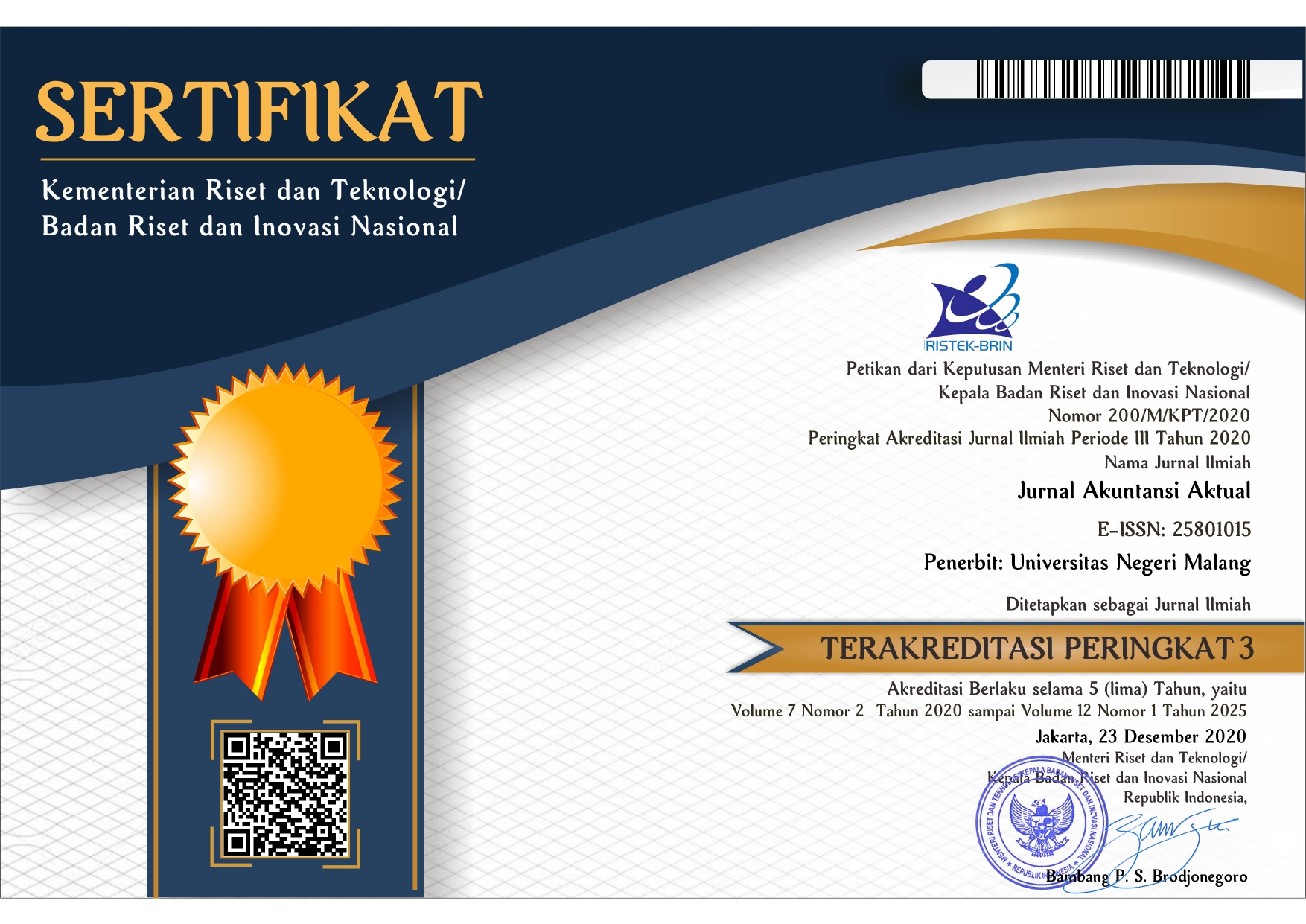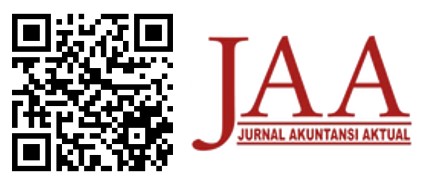Kejujuran dalam Praktik Pelaporan Manajerial: Tinjauan Literatur Sistematis
Abstract
Abstract: Agency theory is a widely adopted prominent management approach. The use of this theory has increased over time, but studies exploring managerial honesty in relation to reporting to shareholders are still limited. This study aims to identify the factors that influence honesty in managerial reporting using a systematic literature review method. Three databases were chosen to search for articles published from 2000 to 2018. The keywords used were honesty, managerial reporting, managerial behavior, and honesty determinant factors. From 1,720 articles identified using keywords search, 15 articles are the core articles which have been systematically reviewed. The results of the study find that the level of honesty in managerial reporting is driven by many factors such as the preference of individuals who have conducted trade-offs for honesty, the existence of profit-sharing plans, information and communication systems chosen by the company, individual morale and the role of peers. The most important efforts to improve honesty in the managerial sphere are starting from individual by committing to act honestly to improve integrity. By synthesizing findings from several articles studied, this study offers opportunities for various research and identify the steps for future research.
Abstrak: Teori keagenan adalah pendekatan manajemen terkemuka yang telah banyak diadopsi. Penggunaan teori ini telah mengalami peningkatan dari waktu ke waktu, tetapi studi yang mengeksplorasi mengenai kejujuran manajerial dalam kaitannya dengan pelaporan kepada pemegang saham masih terbatas. Penelitian ini bertujuan untuk mengidentifikasi faktor-faktor yang mempengaruhi kejujuran dalam pelaporan manajerial dengan menggunakan metode tinjauan literatur sistematis. Tiga database dipilih untuk mencari artikel yang dipublikasikan dari tahun 2000 hingga 2018. Kata kunci yang digunakan adalah honesty, managerial reporting, managerial behavior, dan honesty determinant factor. Dari 1.720 artikel yang didapatkan dengan pencarian kata kunci, 15 artikel merupakan artikel inti yang secara sistematis telah ditinjau. Hasil penelitian menyoroti bahwa tingkat kejujuran dalam pelaporan manajerial didorong oleh banyak hal yaitu preferensi individu yang telah melakukan trade-off untuk kejujuran, adanya rencana pembagian keuntungan, sistem infomasi dan komunikasi yang dipilih perusahaan, moral individu serta peran rekan sejawat. Upaya untuk meningkatkan kejujuran di lingkup manajerial yang paling penting adalah dimulai dari dalam sendiri dengan berkomitmen untuk bertindak secara jujur demi meningkatkan integritas. Dengan mensintesis temuan dari beberapa artikel yang dikaji, maka akan membuka peluang pada berbagai aliran penelitian dan mengidentifikasi langkah-langkah untuk penelitian selanjutnya.
Keywords
Full Text:
PDFReferences
Abdel-Rahim, Y, H., & Stevens, D. E. (2018). Information system precision and honesty in managerial reporting: A re-examination of information asymmetry effects. Accounting, Organizations and Society, 64, 31-43.
Altenburger, M. (2017). The effect of injunctive social norms and dissent on budget reporting honesty. Journal of International Accounting Research, 16(2), 9-31.
Blay, A. D., Gooden, E. S., Mellon, M. J., & Stevens, D. E. (2018). The usefulness of social norm theory in empirical business ethics research: A review and suggestions for future research. Journal of Business Ethics, 152(1), 191-206.
Boster, C., Majerczyk, M., & Tian, Y. (2018). The Effect of Individual and Pooled Profit Sharing Plans on Honesty in Managerial Reporting. Contemporary Accounting Research, 35(2), 696-715.
Brunner, M., & Ostermaier, A. (2017). Peer influence on managerial honesty: The role of transparency and expectation. The Journal of Business Ethics.
Cardinaels, E. (2016). Earnings benchmarks, information systems, and their impact on the degree of honesty in managerial reporting. Accounting, Organizations and Society, 52, 50-62.
Chung, J. O., & Hsu, S. H. (2017). The effect of cognitive moral development on honesty in managerial reporting. Journal of Business Ethics, 145(3), 563-575.
Daumoser, C., Hirsch, B., & Sohn, M. (2018). Honesty in budgeting: a review of morality and control aspects in the budgetary slack literature. Journal of Management Control, 29(2), 115-159.
Drake, A. R., Matuszewski, L. J., & Miller, F. (2014). The effect of personality traits and fairness on honesty in managerial reporting. Advances in management accounting, 43-69.
Evans, J. H., Hannan, R. L., Krishnan, R., & Moser, D. V. (2001). Honesty in managerial reporting. The Accounting Review, 76(4), 537-559.
Grover, S. L. (2005). The truth, the whole truth, and nothing but the truth: The causes and management of workplace lying. Academy of Management Perspectives, 19(2), 148-157.
Hannan, R. L., Rankin, F. W., & Towry, K. L. (2006). The effect of information systems on honesty in managerial reporting: A behavioral perspective. Contemporary Accounting Research, 23(4), 885-918.
Indjejikian, R. J. (1999). Performance evaluation and compensation research: An agency perspective. Accounting Horizons, 13(2), 147-157.
Klewitz, J., & Hansen, E. G. (2014). Sustainability-oriented innovation of SMEs: a systematic review. Journal of cleaner production, 65, 57-75.
Lambert, R. A. (2006). Agency Theory and Management Accounting. Handbooks of management accounting research, 1, 247-268.
Lane, P. J., Koka, B. R., & Pathak, S. (2006). The reification of absorptive capacity: A critical review and rejuvenation of the construct. Academy of management review, 31(4), 833-863.
Matuszewski, L. J. (2010). Honesty in managerial reporting: Is it affected by perceptions of horizontal equity? Journal of Management Accounting Research, 22(1), 233-250.
Murphy, K. (1993). Honesty in the workplace. Pasific Groves: Brooks.
Newman, A. H. (2014). An investigation of how the informal communication of firm preferences influences managerial honesty. Accounting, Organizations and Society, 39(3), 195–207.
Salterio, S. E., & Webb, A. (2010). Honesty in Accounting and Control: A Discussion of “The Effect of Information Systems on Honesty in Managerial Reporting: A Behavioral Perspective”. Contemporary Accounting Research, 23(4), 919–932.
Schreck, P. (2015). Honesty in managerial reporting: How competition affects the benefits and costs of lying. Critical Perspectives on Accounting, 27, 177-188.
Schwering, A. (2017). The influence of peer honesty and anonymity on managerial reporting. Journal of Business Economics, 87(9), 1151-1172.
Thorpe, R., Holt, R., Macpherson, A., & Pittaway, L. (2005). Using knowledge within small and medium‐sized firms: a systematic review of the evidence. International Journal of Management Reviews, 7(4), 257-281.
DOI: http://dx.doi.org/10.17977/um004v6i22019p324
Refbacks
- There are currently no refbacks.

This work is licensed under a Creative Commons Attribution-ShareAlike 4.0 International License.
Jurnal Akuntansi Aktual is indexed by:















